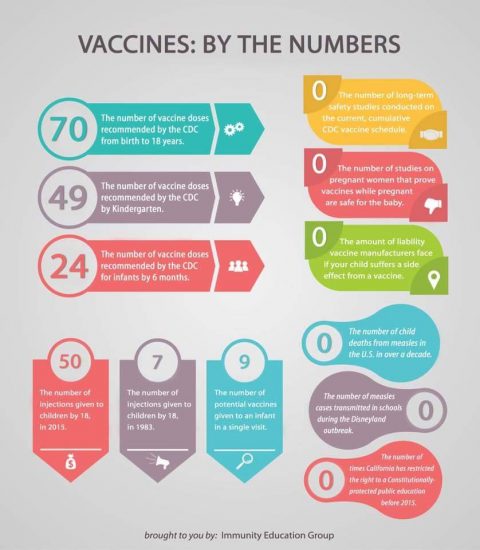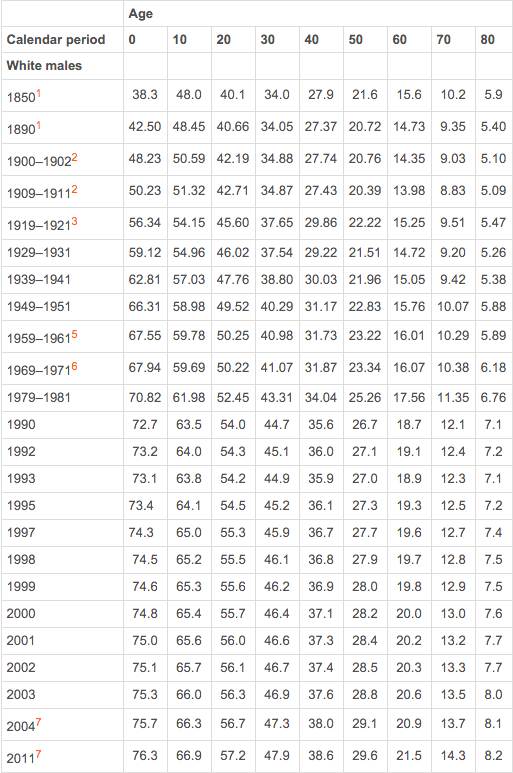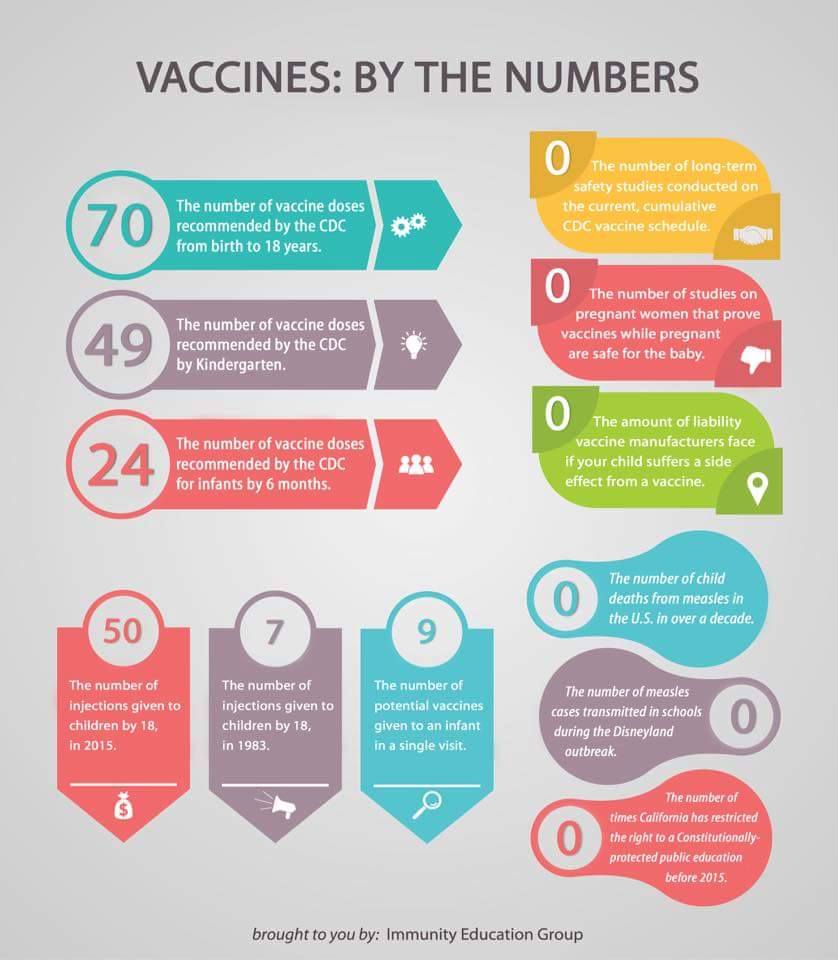
I had posted this info graphic on my Facebook page the other day from the Immunity Education Group. It has been shared and liked and commented on by many people. As I read the comments, I was waiting for the one commenter, usually male, that claims to be ‘science’ based. Without a hiccup, it happened. A gentleman named Troy filled the role.
Funny that…your level of understanding of life expectancy in relation to the implementation of vaccines is the biggest piece of BS logic based on dogma. But it’s not your fault, your spoon fed, ‘science’ based, information comes from the media sources that are funded by the very companies that make the vaccines. Of course they want you to believe that vaccines saved the world from dismal death rates.
Average Life Expectancy
Average life expectancy is just that, an average. If 1 person lives until 80 years old and another person dies at 2 years old, then the average life expectancy rate is 41 years old. It doesn’t mean that everyone had a midlife crisis as they approached their 18th birthday.
In the book, Jefferson’s America, 1760-1815 by Norman K. Risjord, he states:
By the census of 1790, the American population numbered nearly 4 million persons, a figure that would double by 1815 and double again every 25 years for the next century. The population was overwhelmingly rural – more than 95% of the population lived on farms or in small villages. It was also very youthful; nearly half the population was under 16 years old because of early marriages and large families. Life expectancy was short (under 40 years), but that was due to a high infant mortality rate. Those who survived childhood could expect to live a half century or more. Thomas Jefferson lived to the age of 83, and his longevity was not considered remarkable.
Were babies in distress before the implementation of mass vaccination? Absolutely. Was it because of a deficiency of vaccines? There’s a different way to look at life expectancy. Obviously infant mortality was high in the 1800s and has improved ever since. But is it a result of vaccination?
Life Expectancy by Age, 1850–2011

The expectation of life at a specified age is the average number of years that members of a hypothetical group of people of the same age would continue to live if they were subject throughout the remainder of their lives to the same mortality rate. http://www.infoplease.com/ipa/A0005140.html
If you look at 1850, a white, male infant was expected to only live 38 years. But if that child made it to 10 years old, his life expectancy jumped to 58 years old (10 + 48). If a man lived to 80 years old like Thomas Jefferson, he was expected to live until almost 86. By 1950, you can see a white, male born in the US had a life expectancy to 66 years old. That’s almost a double in life span, just like Troy said. Nearly tripled? That’s just ridiculous. But was it due to vaccines?
The mass vaccination program that targeted school age kids and younger didn’t start until 1954. Funny that. 90% of polio was already wiped out before the vaccine was even licensed. Funny that. Since mass vaccination started in the mid 1950s, life expectancy of an infant has only increased 9 years. Funny that.
If vaccines were the reason life expectancy doubled (or tripled) than a white, male born in 2015 should expect to live to 130 years old. The life expectancy was already 60 before mass vaccination.
People like Troy, in theory, can still boast that life expectancy has increased since the administration of mass vaccination. Life expectancy for a white, male infant has increased 9 years in the past 60 years. But vaccine dogma followers seem to also forget about the availability of clean water, antibiotics, readily available nutrition, sewage systems, and sanitary birth practices.
Using the same logic as vaccine proponents, I could say chiropractic increased life span. Maybe it’s nicotine? Maybe it’s cocaine (the use of cocaine drastically increased in the early 80s thanks to Pablo Escobar. I’ve been watching Narcos). Maybe it was McDonald’s that increased life span. The golden arches commenced in 1955. Funny that.
Like I always say, I don’t care if you vaccinate or not. The choice is yours…at least for now.




The life expectancy charts clearly demonstrate that most of the increase in life expectancy is due to fewer people dying at a young age. That is exactly what would be expected if a major part of it was due to fewer deaths due to diseases (by far the greatest killer of the young in the pre vaccination era.)
The death rates of diseases plummeted whenever vaccines became available for them.
There simply is no other credible evidence for the increase in life expectancy in the young other than vaccines, antibiotics and improved sanitation (the second greatest cause for the increase in life expectancy after vaccination). What clearly points to the importance of vaccination over antibiotics is that the death rate plummeted after vaccination became available for diseases for which antibiotics were not available (and still are not for many).
The key point here is that repeatedly across many diseases, the death rates from those diseases plummeted in proportion and in close timing with the introduction and extent of use of vaccines. This is vastly more powerful evidence that the “straw dog” ‘argument’ you have misrepresented as the supposed reason for believing that vaccines are responsible for a major portion of increase in life expectancy.
Please note that I believe strongly in SOME forms of alternative medicine and that conventional medicine is vastly overrated and, on the whole, clearly does more harm than good. But vaccines are a very notable exception. It makes no sense to “throw out the baby with the bathwater” as you do when you denigrate vaccines.
No one dies of Smallpox anymore. Except for (highly unfortunate) storage in a few labs, this disease does not even exist anymore. And there is no remotely credible reason for that other than the introduction of vaccination. Some vaccines are not particularly valuable and useful and may be used far more than is wise. But throwing out the baby with the bathwater is still a very bad idea.
Vaccines should never be substituted for proper sanitation. And they should not be used to enable severely abusive factory farming at densities that would otherwise not be possible (and ensuring that if a disease is fostered to become more pathogenic under such conditions and spread into the human population already resistant to the vaccine because of its inadvisable use to enable factory farming. But that is still no excuse to throw out the baby with the bathwater (which BTW you will LITERALLY sometimes wind up doing if you don’t use vaccines.)
I suspect that you probably have some very valid and valuable points to make about some of the many problems with conventional medicine (which IMHO is deeply flawed right down to the core) If so, IMHO, your grossly overstated points and straw dog misrepresentation of the opposing argument is causing them to get lost in the noise.
PS your use of ad hominem arguments is highly counterproductive and seriously detracts from the discussion.
You state that vaccination was the greatest cause of reduction in mortality over the last 100 years or so and health and hygiene was second. How can you know this? Why couldn’t health and hygiene be number 1? To support this idea, compare deaths from scarlet fever to all the other diseases that had vaccines over the last century. There was no vaccine for scarlet fever but its mortality dropped with all the other diseases on a similar curve. Diptheria, Tetanus, Pertussis all dropped with Scarlet Fever as food, water, sanitation and building codes improved. They all dropped together. This is convincing evidence even though not proof that better living conditions and care reduced the death rate of all the “killer” diseases in the last century. Refrigeration alone must have been a large factor. Spoiled food has been suggested to be a major cause of many illnesses.